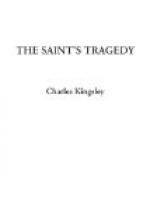[Guta enters.]
Alas! Returned alone! Where has my sister been?
Guta. Thank heaven you hear alone, for such
sad sight would haunt
Henceforth your young hopes—crush your
shuddering fancy down
With dread of like fierce anguish.
You saw her bound forth: we towards her bower
in haste
Ran trembling: spell-bound there, before her
bridal-bed
She stood, while wan smiles flickered, like the northern
dawn,
Across her worn cheeks’ ice-field; keenest memories
then
Rushed with strong shudderings through her—as
the winged shaft
Springs from the tense nerve, so her passion hurled
her forth
Sweeping, like fierce ghost, on through hall and corridor,
Tearless, with wide eyes staring, while a ghastly
wind
Moaned on through roof and rafter, and the empty helms
Along the walls ran clattering, and above her waved
Dead heroes’ banners; swift and yet more swift
she drove
Still seeking aimless; sheer against the opposing
wall
At last dashed reckless—there with frantic
fingers clutched
Blindly the ribbed oak, till that frost of rage
Dissolved itself in tears, and like a babe,
With inarticulate moans, and folded hands,
She followed those who led her, as if the sun
On her life’s dial had gone back seven years,
And she were once again the dumb sad child
We knew her ere she married.
Isen [entering]. As after wolf wolf presses, leaping through the snow-glades, So woe on woe throngs surging up.
Guta. What? treason?
Isen. Treason, and of the foulest. From her state she’s rudely thrust; Her keys are seized; her weeping babies pent from her: The wenches stop their sobs to sneer askance, And greet their fallen censor’s new mischance.
Agnes. Alas! Who dared to do this wrong?
Isen. Your mother and your mother’s son—
Judge you, if it was knightly done.
Guta. See! see! she comes, with heaving breast,
With bursting eyes, and purpled brow:
Oh that the traitors saw her now!
They know not, sightless fools, the heart they break.
[Elizabeth enters slowly.]
Eliz. He is in purgatory now! Alas!
Angels! be pitiful! deal gently with him!
His sins were gentle! That’s one cause
left for living—
To pray, and pray for him: why all these months
I prayed,—and here’s my answer:
Dead of a fever!
Why thus? so soon! Only six years for love!
While any formal, heartless matrimony,
Patched up by Court intrigues, and threats of cloisters,
Drags on for six times six, and peasant slaves
Grow old on the same straw, and hand in hand
Slip from life’s oozy bank, to float at ease.
[A knocking at the door.]
That’s some petitioner.
Go to—I will not hear them: why should
I work,
When he is dead? Alas! was that my sin?
Was he, not Christ, my lodestar? Why not warn
me?
Too late! What’s this foul dream?
Dead at Otranto—
Parched by Italian suns—no woman by him—
He was too chaste! Nought but rude men to nurse!—
If I had been there, I should have watched by him—
Guessed every fancy—God! I might
have saved him!




